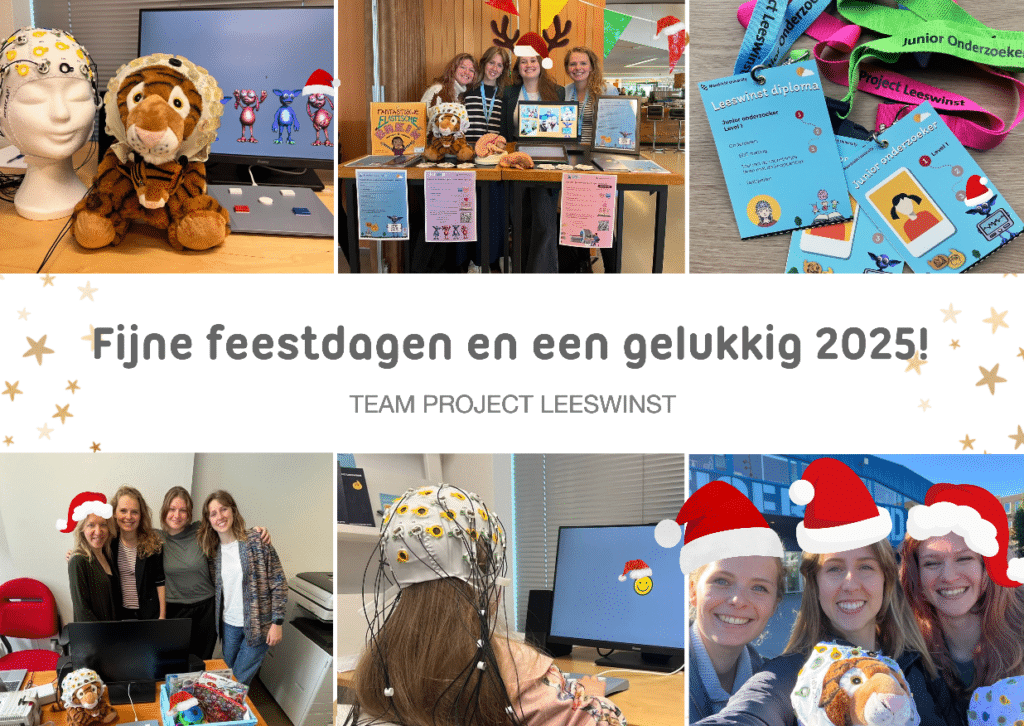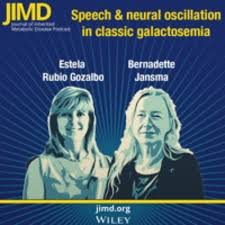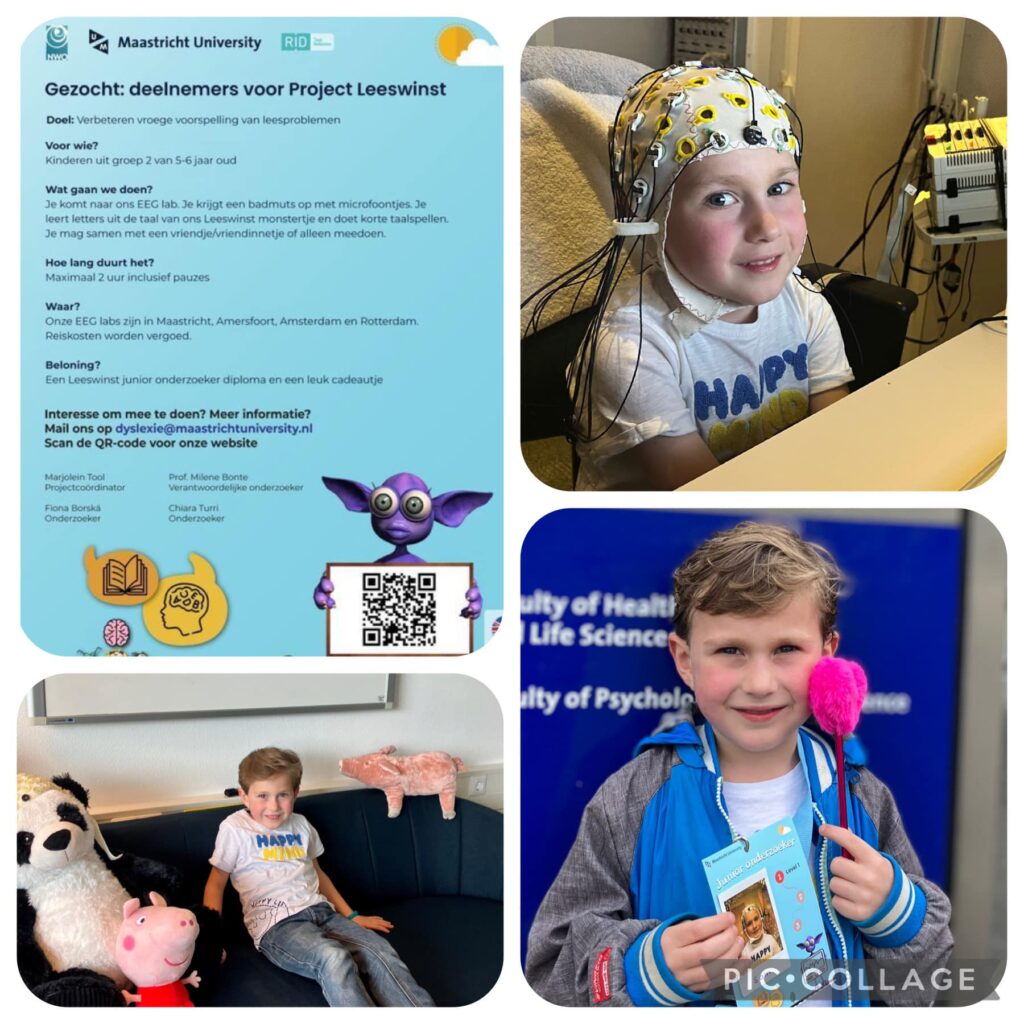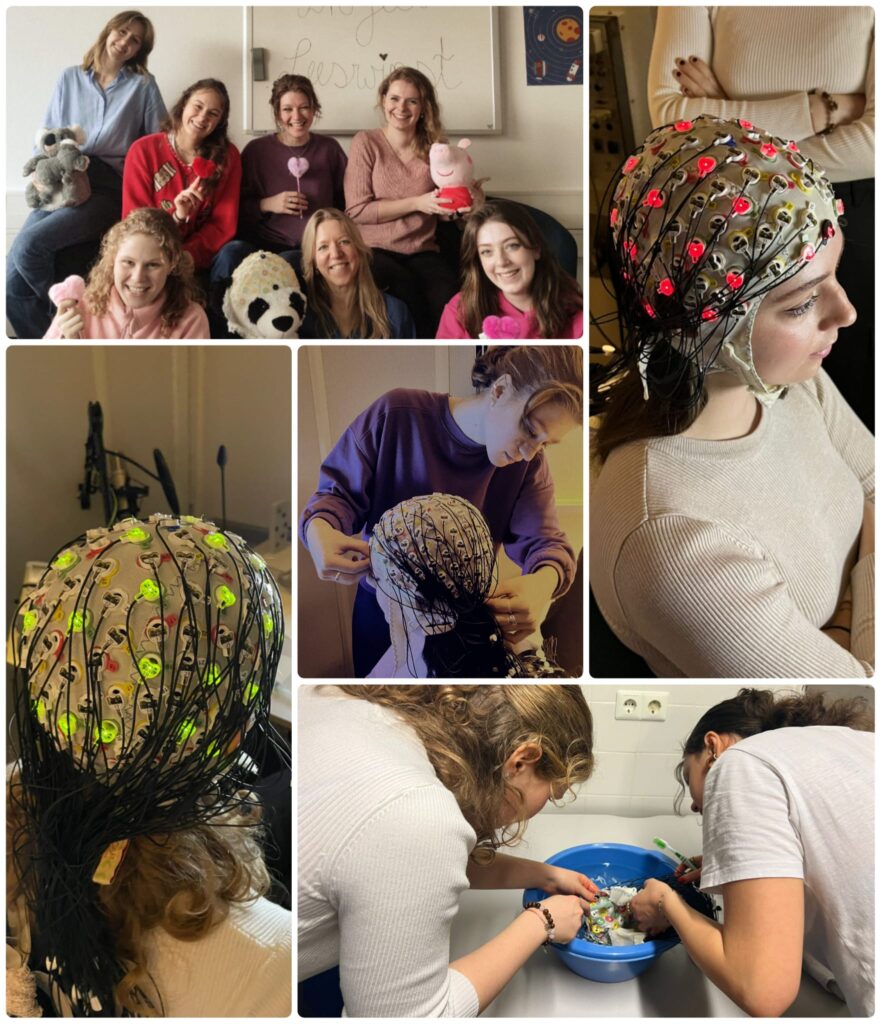First results Project Leeswinst
Comments Off on First results Project LeeswinstIn Project Leeswinst, we aim to improve early detection of reading problems by developing a learning task where children learn to pair new letter-like symbols to speech sounds. We investigate how children learn these new letters and how their brain activity changes during this learning. With this knowledge, we will develop a digital learning test that predicts who will learn to read fluently and who will need extra support to prevent reading problems.
We are very happy that 67 children already participated as junior researchers in our study and that other children will still join this summer. A sneak peek of our first results shows that children indeed show large differences in learning the new letters. Interestingly, children with and without a family member with dyslexia did not differ in letter learning. We do see that children with a family member with dyslexia tend to score slightly lower when asked to recognize which words start or end with the same sound (for example: boom | doos – raam – tak – wieg).
How did children’s brain activity change while they were learning the new letters? Faster learners show greater activity changes in brain regions that are important for reading development. For example, in audiovisual areas and in the frontal cortex, which is involved in attention skills.
The first children have now come back to visit our labs in Maastricht, Amsterdam and Amersfoort for the follow-up (level 2). We are excited to discover what the children have learned this year and whether our letter learning task is indeed a good predictor of reading problems. This summer, we will also start an fMRI study in Maastricht to better understand how the brain of 8–12-year-old children with/without dyslexia changes during letter learning.
We thank all participating families and schools for their support and look forward to sharing more results as the project continues!
Interested in participating? Go to our get involved page!
AdaBd Conference in Switzerland
Comments Off on AdaBd Conference in SwitzerlandIn May, we presented our first Leeswinst and Leeskans results at an international conference in Switzerland. Our lab contributed with a talk by Milene Bonte and two poster presentations by researchers Fiona Borská, Chiara Turri, and Leandra Zinke. Our projects’ findings sparked the interest of colleagues working on closely related topics. Their input will be very useful for further analyzing our data in the coming months.

Lectures in April and May
Comments Off on Lectures in April and MayIn April and May, we participated in various events with Project Leeswinst and Leeskans to share more about dyslexia, the brain, and the early prediction of reading difficulties:
- Conference on Writing Education for Primary and Secondary Schools. On April 10, we held a knowledge session in Gouda.
- Round Table: Library Toolbox (Cubiss). On May 15, we gave an interactive lecture in Heerlen.
- Dyslexia in Secondary Education Conference (Medilex). On May 16, we presented a lecture in Utrecht.
Milene also shared more about our research in a special newsletter edition of the Brightlands Maastricht Health Campus Glossy.
Expedition Next in Roermond
Comments Off on Expedition Next in RoermondIn April, we were present at Expeditie NEXT 2025 in Roermond. During this national science festival, children can explore science in many different forms. At our stand Brain Heroes, parents and children could take a quiz and learn how our brain understands language. We also shared more about our research projects Leeswinst and Leeskans.
Will you join us next year in Enkhuizen?

Wanted: schools (groep 2/3) for Project Leeskans
Comments Off on Wanted: schools (groep 2/3) for Project LeeskansWould your school like to help improve the early detection of reading difficulties, self-image, and reading motivation? We are looking for students at the end of kindergarten / beginning of first grade (equivalent to Dutch group 2/3) who would like to try out our educational game!
What does it involve?
- Schools share our information letter with parents
- Children participate in the study if parents give consent
- We will come to your school for the research (2 sessions of 30 minutes per child, individual assessment)
- School visits are scheduled in consultation, between mid-April and October 2025
Where does the research take place?
We will come to your school!
How can your school participate?
Send an email to dyslexia@maastrichtuniversity.nl or sign up via this form.
Happy holidays and the best wishes for 2025!
Comments Off on Happy holidays and the best wishes for 2025!
Do you also want to participate? (video)
Comments Off on Do you also want to participate? (video)We are super happy with all children that have participated in our research project: Leeswinst! The video below gives you an impression of the EEG sessions. Does your child also want to participate in our study? Please contact us through dyslexie@maastrichtuniversity.nl or our “Get involved” page!
Bernadette Jansma appointed as new Chair of the Supervisory Board Donders Institute
Comments Off on Bernadette Jansma appointed as new Chair of the Supervisory Board Donders InstituteIn september 2024, Bernadette Jasma has been appointed as the new Chair of Donders Institute’s Supervisory Board. he Donders Institute explores the human brain, cognition, and behaviour across various disciplines, including medicine, physics, biology, psychology, AI, and language studies. Read more about the Donders Institute and the appointment of Bernadette here.
We are looking for children in groep 3 for ‘Project Leeswinst’!
Comments Off on We are looking for children in groep 3 for ‘Project Leeswinst’!The new school year has begun! Until now, a lot of children from eind groep 2 have participated in our study. This school year we are looking for children in groep 3 (5-7 year old children). Do you want to contribute to the early prediction of reading problems? Please participate in our research project!
What are we going to do?
- You visit our EEG lab. Your child will wear a swimming cap with microphones.
- Your child will learn letters from our Leeswinst monster’ language and play short language games.
- Your child can participate together with a friend or alone.
- It will take about 2 hours including breaks.
- We will make it a fun trip! See our Facebook and Instagram pages for an impression.
What is the reward?
- Leeswinst junior researcher diploma
- A nice gift
- Travel expenses wil be reimbursed
- In 2025-2026, we will organise a child symposium in which we share the results of our study with parents and children.
Where are our EEG labs?
In Maastricht, Amersfoort en Amsterdam
How can I participate?
Send an e-mail to dyslexie@maastrichtuniversity.nl of fill in the form on https://mbic-languagelab.nl/onderzoek/
PAS festival 7 september
Comments Off on PAS festival 7 septemberDo you want to know more about early prediction of reading problems? On september 7th, Milene Bonte gives a lecture at the PAS festival in Maastricht!
19:30 – 20:00 – Nederlandse lezing
21:00 – 21:30 – English lecture
Children’s reading skills vary widely and reading problems (dyslexia) are only diagnosed after they have developed. Can we improve early prediction of reading problems? What can we learn from brain research? And why is it important to understand individual differences in learning potential, rather than simply relying on static snapshots of knowledge?
For more info about the lecture and the full PAS program (6-7 Sept), see https://english.pasmaastricht.nl/
Project Leeswinst
Do you want to contribute to our research? We are looking for children from ‘groep 3’. You can apply on our website https://mbic-languagelab.nl/deelnemen or by mailing to dyslexie@maastrichtuniversity.nl
Maastricht, Amsterdam, Amersfoort.
Podcast about speech and neural oscillation in classic galactosemia
Comments Off on Podcast about speech and neural oscillation in classic galactosemiaEstela Rubio and Bernadette Jansma explain in an interview (JIMD Podcasts) how they applied transcranial alternating current stimulation in Galactosemia patients with language production deficits. The stimulation reduced naming errors. We hope to investigate this now in a larger cohort, and for other cognitive domains in this patient group.
You can find the postcast here.

Start Project Leeswinst
Comments Off on Start Project LeeswinstIn April, we started the first measurements in Amersfoort and Maastricht. We are super happy with our first ‘junior researchers’! One of the participating parents shared a great impression on LinkedIn and Facebook.
Do you have a child in groep 2? Then sign up for Project Leeswinst via dyslexie@maastrichtuniversity.nl or via the ‘Get Involved’ button on the website!

Team training Project Leeswinst
Comments Off on Team training Project LeeswinstIn February, the research team of Project Leeswinst came together for a training day! Our team of students, PhD candidates, and coordinators went through all procedures together and practiced on each other. We were trained for EEG data collection and administering neuropsychological tests on children. We specifically focused on ways to make the research as enjoyable and comfortable as possible for young children. For instance, with children, we use a smaller EEG cap with fewer electrodes and demonstrate the cap application first on a stuffed toy.
Due to the diverse backgrounds of our team members, everyone was able to contribute in their own way to the training. It was an informative day, and we are looking forward to kicking off with our enthusiastic team!

Wanted: participants for ‘Project Leeswinst’!
Leave a CommentWould you like to contribute to the early prediction of reading problems? We are looking for 5, 6 and 7 year olds (groep 2 and groep 3) to participate in our study!
What does it involve?
- You are invited to visit one of our EEG labs.
- Your child can participate together with a friend or alone.
- Your child learns letters from our Leeswinst monster’s language and plays language games.
- Together, we will make this a fun experience!
What’s in it for you?
- Our Leeswinst junior researcher diploma
- A nice gift
- Travel expenses will be reimbursed
Where are our EEG labs?
In Maastricht, Amersfoort, Amsterdam en Rotterdam
How can we participate?
Send an e-mail to dyslexie@maastrichtuniversity.nl of fill in the form at https://mbic-languagelab.nl/onderzoek/
Predicting reading problems at preschool age?
Leave a CommentWe currently cannot accurately predict which children will develop problems in learning to read. There simply isn’t a clear measure for it. If it’s up to Professor Milene Bonte, that will change in a few years. Thanks to the Vici grant she secured, her lab can develop a digital task for preschoolers with fictional symbols and sounds. This learning task should provide a reliable indication of the child’s learning potential. Based on this, the teacher can determine if the child needs additional support. Milene Bonte and Hansje Planjer, Manager of Care and Education at IJsselgroep and a member of the Policy Advisory Committee of the NKD, will discuss this further.
Read the conversation between Milene Bonte and Hansje Planjer at the NKD website!